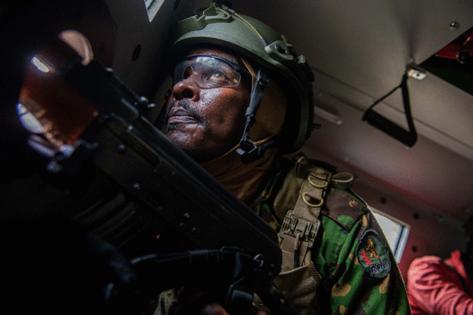Commentary: The strife in Ecuador, Mexico and Haiti is easy to miss in our frenetic news cycle
Published in Op Eds
The international news cycle proceeds at such a fast pace these days that we tend to miss some of the significant stories that are bubbling beneath the surface. Many come from the Western Hemisphere, known as America’s backyard.
Compared to regions such as Europe and the Middle East, the Western Hemisphere seems like a relatively peaceful place. There is no state-on-state conflict, the insurgent groups that proliferated throughout the area during the Cold War are pretty much gone and, to the extent there is competition, it’s largely about trade and economics.
But that doesn’t mean the Western Hemisphere is a peaceful oasis. Indeed, there is plenty of conflict happening within states in the region, nearly all powered by a combination of corrupt governance, a lack of state authority and substate entities that have the wealth, firepower and reach to make the lives of ordinary people hell. Three states in particular are getting the worst of it: Ecuador, Mexico and Haiti.
Of all the countries on this list, Ecuador’s descent into drug-infested warfare is the most dramatic. The small South American country along the Pacific used to be one of Latin America’s most peaceful countries, a place where scores of Americans would vacation. Today, however, it’s one of the most violent, spurred by a constellation of gangs and narcotrafficking organizations that team up with Colombian and Mexican cartels to ship cocaine into the United States; 2024 was the second-most violent year in the country’s history, with nearly 7,000 homicides. This year hasn’t been much better; at almost 1,000 homicides, this May was the deadliest month in Ecuador on record.
The Ecuadorian government under reelected President Daniel Noboa has been flailing in response. The millennial commander-in-chief, whose past campaign was prefaced on restoring security to the country, has chosen an iron-fisted approach. In January 2024, shortly after resuming office, he declared a national emergency and a war against narcotraffickers. Soldiers are now on the streets doing work of police. Last month, the National Assembly approved a constitutional reform that would give more powers to the state, in effect codifying Noboa’s state of emergency and allowing security forces to conduct raids without warrants. Noboa has even lobbied the Donald Trump administration to deploy U.S. troops into the country to assist his war on drugs.
Mexico is no stranger to cartel violence. In fact, Mexico’s homicide rate, at more than 30,000, makes Ecuador’s look paltry. If Ecuador’s narcotrafficking war is a relatively new phenomenon for the country’s security landscape, Mexico’s is well established and ever present. While the Sinaloa and New Jalisco Generation cartels get the most attention in the United States, there are dozens of other regional and local criminal syndicates that either partner with these two cartels or are attempting to strike gold on their own. The Mexican state of Sinaloa continues to be in a state of de facto civil war as the Sinaloa Cartel’s two major factions, one led by the sons of former drug lord Joaquín “El Chapo” Guzmán, battle it out for the spoils.
Violence in Mexico has gotten only worse. With the exception of Andres Manuel López Obrador, who as president started his tenure with a less militarized approach to combating the cartels, successive Mexican administrations have bought into the “war on drugs” framing. The assumption was that deploying the Mexican army on the streets and taking out senior cartel leadership would result in those organizations collapsing. But the opposite has happened; the cartels adapted or splintered into smaller groups that now fight each other for territory and trafficking routes — producing more violence and stretching the limited capacities of the Mexican army. Mexican President Claudia Sheinbaum is opting for a more intelligence-driven strategy, but it’s too soon to tell whether the results will be different.
It’s Haiti that is by far the most hopeless case. The country hasn’t had an elected president since 2021, when Jovenel Moïse was assassinated. There aren’t any elected lawmakers in the assembly either; its interim prime minister, the wildly unpopular Ariel Henry, resigned last year when he couldn’t get back into Haiti after the gangs shut down the airports. Speaking of the gangs, they control approximately 90% of the capital city. The transitional governing council, which is supposed to serve as an interim government, is instead a feckless body riven by internecine fighting between various personalities and interest groups.
Haitian officials are at a loss for answers and have resorted to desperate measures, such as teaming up with Erik Prince, whose Blackwater mercenary group gained a poor reputation during the U.S. occupation of Iraq. The Haitian security forces, or what’s left of them, are now using drones to target gang leaders, although none have been killed. Meanwhile, Haitians are taking the law into their own hands by establishing self-defense groups; some have turned into vigilantes that are no better than the gangs they are meant to fight. If Haiti hasn’t reached anarchy, then it’s close.
What responsibility does Washington, D.C., have to ameliorate these crises? Some will argue a lot. After all, most of the firearms that make their way to Mexico and Haiti come from the United States.
In the long run, though, the United States can’t force foreign governments to change their policies and practices. And that’s what’s required here.
____
Daniel DePetris is a fellow at Defense Priorities and a foreign affairs columnist for the Chicago Tribune.
___
©2025 Chicago Tribune. Visit at chicagotribune.com. Distributed by Tribune Content Agency, LLC.

























































Comments